| EPOXY RESIN COATING |
 |
| Most people know resin as a hard, clear surface, but in fact there is much more to this versatile product. From artistic to aerospace, the possibilities for resin are limited by the imagination of private and commercial manufacturers. This article will explore the many facets of epoxy resin, from the various combinations to its multitude of applications.
|
SUMMARY
Epoxy Resin, known chemically as polyepoxides, are reactive prepolymers and polymers that can be mixed to react with themselves, or with many other reactants such as alcohols, phenols, and acids. These co-reactants are referred to as hardeners because they cause the epoxy to solidify, or cure.
Depending on the reactants, epoxy resins can have a wide range of properties, from fast to slow curing, opaque or clear color, water-proof or just water-resistant, and flexible or rigid. As such, resin is used in for many different applications.
In addition to artistic uses, epoxy resins can be used for many different purposes. This article outlines some of the may ways this multi-purpose product can be utilized for:
- Adhesives
- Industrial products
- Electronics
- Aerospace products
- Home appliances and furniture
In addition, the effect of different reactants will be explained in detail, as well as the above-mentioned properties. Finally, KeenART Media's own resin coating applications will be explored.
|
| RESIN PROPERTIES
|
 |
|
Resin can have different properties, depending on the other compounds with which it is reacted or cured. On its own, resin has poor chemical, mechanical and heat resistant qualities. When it is cured, an exothermic reaction occurs and the properties of the mixture are altered.
| CO-REACTANT |
RESULT |
Epoxy Resin
(Homopolymerisation) |
When combined with itself with a addition of a catalyst, resin has high thermal and chemical resistance, but is very brittle. Homopolymerisation can create UV coatings, if an appropriate catalyst is used. |
| Amines |
When combined, a secondary amine is formed which can also react with the resin. The severity of this second reaction depends on the type of amine used. This co-reactant can improve temperature resistance, and alter viscosity and other resistance. Applications include flooring and other protective coatings. |
| Anhydrides |
Used when curing is taking place at very high temperatures. This co-reactant has low viscosity and high latency properties, and may be used for creating high voltage electric insulation. |
| Phenols |
Polyphenols are used in high temperatures as well, and often require an added catalyst. The resulting resin has higher chemical and oxidation resistance. Common phenols are solids, so this co-reactant is often used to create powder coatings for appliances. |
| Thiols |
This co-reactant cures the epoxy very readily, even at low temperatures. Though high resistance is rarely produced, this option is ideal for production where high temperatures are not possible. Domestic adhesives are commonly made using thiols. |
|
| RESIN APPLICATIONS
|
 |
ADHESIVES
- Under the category of Structural Adhesives or Engineering Adhesives
- Used when a high strength bond between materials is vital
- May be flexible or rigid, opaque or transparent
- Better heat resistance than other adhesives
- Construction of:
- aircraft
- automobiles and boats
- bicycles
- snowboards and skis
- golf clubs
INDUSTRIAL USES
- Tooling applications for the production of casts, molds, laminates, fixtures, composite parts
- This "plastic" can replace wood, metal, and other materials
- Results in a lower cost and shorter production time
- More expensive than other resins, but stronger and more temperature resistant for certain applications
ELECTRONICS
- Serve as good electrical insulators
- Protect against moisture, dust, short circuiting
- Used for bonding circuit boards
- Better for heat conductivity
- Used in construction of:
- motors
- generators
- transformers
- LEDs (clear for full aesthetic or fogged for diffraction)
- inductors
AEROSPACE
- Used as a structural matrix, reinforced with fibers of glass, Kevlar, or carbon
- Heavy duty adhesive
- Protective heat shielding (ie: Apollo 8)
APPLIANCES AND FURNITURE
- Creates an extremely hard, protective coating
- Cast iron and cast steel coatings
- Reduced flammability compared to other coatings
- Primers for improved paint adhesion
- Assist metal surfaces in resisting rust
- Environmentally friendly alternative to some laminates
- Specific applications:
- powder coatings on washers, driers, etc
- Interior of metal food cans
- Decorative flooring
|
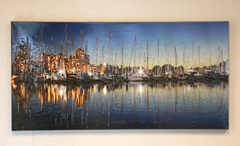
A canvas print with two layers Resin, 2nd is texturized
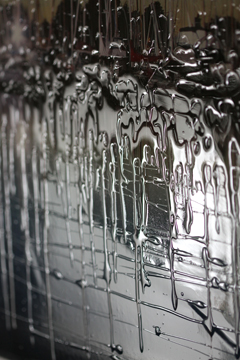
Texturized effect close up
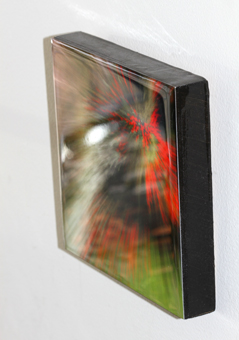
A wood panel print with resin and painted edge
|
| RESIN AT KEENART MEDIA
|
 |
|
At KeenART Media, we offer various products enhanced with epoxy resin.
Resin on artistic displays results in an eye-catching, high gloss surface that adds vividness to color and depth and dimension to grayscale images, while protecting the product from scratching, scuffing, and environmental damages.
Though similar to a glass or plexiglass cover over a flat artwork, because the resin is adhered directly to the image, an almost three dimensional effect is achieved due to the way the light is forced to reflect and refract off the surface. Our high quality resin is UV resistant, as well, which means your print will not fade, and the resin will not yellow or degrade over time. Nonetheless, we suggest your print be kept indoors and out of direct sunlight to keep it beautiful for as long as possible.
Prints and original artwork can be coated in resin, though it is important to keep in mind that this application is permanent and removal will damage the image. Resin will adhere, diamond-hard and with high clarity, to wood, acrylic and watercolor paints, paper prints, canvas, and most three dimensional objects. Wax paper and soft media, like pastels and charcoal, to not work well with resin coatings. (If you have an original in one of these mediums, you can always choose resin coating for the print!)
RESIN ON CANVAS
You can choose to have your gallery wrapped canvas print coated with resin. This process will eliminate the delicate flexibility of the canvas and provide a reflective sheen that protects the image. The bold colors in the print will pop and the viewer will feel as though they are really there, seeing the original scene.
RESIN ON DI BOND
Aluminium Di Bond is a rigid surface made from two pieces of pure aluminium with a polyethylene core. Any printed image can be dry mounted onto this thin surface and displayed on the wall with an invisible float hanger.
Adding resin to a Di Bond dry mount creates a contemporary display that softens the sharp edges of the uncoated mount, and protects from dust and fingerprints.
Alternately, your image can be mounted on Gatorboard, foam board, or Sinta prior to being coated with resin.
RESIN ON WOOD
Your paper print can be mounted on a wood panel, which offers the depth of a canvas print, with the natural touch of a bare, wood grain drop edge.
The result is a unique combination of contemporary and rustic, with the sharp, frameless image surrounded by the soft tones of the wood.
RESIN ON 3-DIMENSIONAL OBJECTS
Have a three dimensional sculpture you would like to enhance and reinforce? Resin can be applied to collages, relief carvings or found object displays, and many in-the-round carvings or constructions.
Depending on the number of resin layers and the depth of the object, resin can be applied to make objects appear to be floating within the sculpture, or simply create a high gloss shine and protective coating on the entire project.
MULTIPLE RESIN LAYERS
When you order resin coating, you can select how many layers of resin you would like added to the product.
Each resin coating is 1/16" thick, and we recommend a double coating for photographs as 1/8" is the best depth to achieve the above-mentioned qualities. However, there is no limit to the number of layers that can be applied to your print. The deeper the resin layer, the most dimension your image will have.
|

Resin on a canvas print
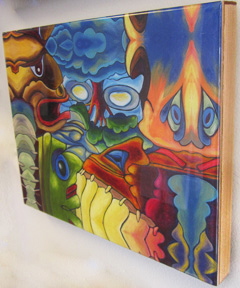
A print on wood panel with resin
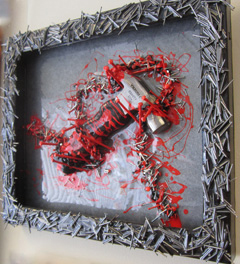
A 3D found object relief coated with resin
|
| Epoxy Resin Videos |
 |
|
|
|
| Resin On Canvas Gallery Wraps, Wood Panels, Foamcore, Di-Bond And 3d-Objetcs - One Layer And Multi-Layers
|
Resin On Wood Panels:
|
| Resin has a wide range of real world applications, utilized long before the art possibilities were widely explored. Today, resin enhances and elevates prints, original artworks and sculptures to a new level of rich color and tangibility.
If you would like your artwork coated in resin, you can find out the cost using our Resin Coating price calculator. Please don't hesitate to contact us with any questions or concerns. Our knowledgeable staff are happy to assist you in deciding what pieces would most benefit from resin, and the ideal amount to apply. You may also read our Resin FAQ section: Resin Coating FAQ
Ready to try applying resin on your own? We sell the product we use in our online store. Order now: EX-74 Epoxy Resin.
|

|
| Sample Images, mouse over to see the large image. |
|
© 2002-2026 - KeenART Media Ltd.
|
|
| |
|
